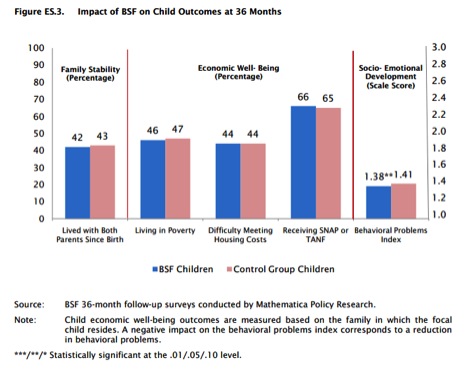Bradford Wilcox and the right-wing family policy community have found a way to make millions of dollars, taking from the welfare budget, to do battle on behalf of the institution of marriage. The premise of their boondoggle is twofold: that increasing the number of marriages will reduce poverty, and that the federal government can accomplish that if it just spends enough of poor single parents’ former money. They’ve gotten the project written into the welfare law. And they have the over-assetted conservative foundations convinced that this is a useful waste of their millions. So they are understandably defensive when social scientists point out that it’s a scam.
In this guest post, Ohio State University sociologist Kristi Williams responds to Wilcox’s latest commentary.
By Kristi Williams
In a recent article for the American Enterprise Institute and an op-ed in the Deseret News, W. Bradford Wilcox, director of the National Marriage Project critiques my recent briefing report for the Council on Contemporary Families. My report, “Promoting Marriage among Single Mothers: An Ineffective Weapon in the War on Poverty” discusses the most rigorous experimental evidence available about the effectiveness of federally-funded relationship skills training programs to promote marriage among unmarried parents. The conclusion: They have failed spectacularly.
Wilcox points to one of the programs in Oklahoma as a success. He writes, “Indeed, the Oklahoma Marriage Initiative has succeeded in helping poor, unmarried couples with children enjoy more stable relationships.” Really? After 36 months, participation in the Oklahoma program failed to improve: (a) couples’ relationship quality or the probability of being married (b) the quality of the co-parenting relationship, (c) father involvement and parenting behavior or, most importantly, (c) child poverty and socioemotional development. From the “Building Strong Families” program report:
More concerning is the fact that across the 8 program sites included in the study, participation was associated with modest negative effects on father involvement, father financial support of children, and the likelihood that couple would be living together or romantically involved (although they were no more likely to be married). Although children whose parents were in the control group had slightly higher average scores (1.41) on an index of behavior problems and socioemotional development than children of participating parents (1.38), these benefits were only seen in the 4 sites that included home visits and parenting training. Therefore, the report concludes that the modest effect on behavior problems “is more likely due to the home visiting services offered in these 4 BSF sites than it is to the relationship skills education services that were offered in all BSF sites.”
Why does Wilcox call the Oklahoma program a success? There is only one thing he can possibly be talking about: At the 3-year follow up, slightly more children whose parents participated had lived with both parents since birth (49% compared to 41% in the control group). But what did this get the children? Not lower poverty, not fewer behavior problems and not more father involvement. This underscores the point of my briefing report: Focusing on keeping low income single parents together at all costs is unlikely to solve the biggest problems facing single mothers and their children.
The only explanation for Wilcox pointing to Oklahoma as a success is that what he really cares about is keeping couples together and promoting marriage at all costs—regardless of whether doing so reduces poverty and helps children and single mothers live better lives. It’s one thing if you want to preach publicly about the value of marriage from an ideological or religious perspective. But when you claim that you are doing so out of a desire to reduce poverty and you distort the research evidence in order to support your argument, it’s time to omit the Ph.D. from your byline.
The other central argument in Wilcox’s piece is that pointing to the failure of marriage promotion policies is a straw man because no one believes that marriage is a panacea for the problems facing single mothers and their children. But the public dialogue, much of it framed by Wilcox himself, suggests otherwise. One needs only about 5 seconds and a search engine to find Wilcox telling unmarried parents to “put a ring on it” in the New York Times and in public lectures. More troubling, Florida Republican Senator Marco Rubio recently said, “The truth is that the greatest tool to lift people, to lift children and families from poverty, is one that decreases the probability of child poverty by 82 percent. But it isn’t a government program. It’s called marriage.” We could quibble about the meaning of the word, “panacea,” but Wilcox is just wrong when he implies that no one thinks marriage is a central answer to poverty among single mothers. Incidentally, Rubio’s conclusion relies on a fundamental misunderstanding of causality, as described here. Maybe we should forgive Senator Rubio for misunderstanding the data because he is not a trained social scientist. But what is Brad Wilcox’s excuse?




“Bradford Wilcox and the right-wing family policy community have found a way to make millions of dollars, taking from the welfare budget, to do battle on behalf of the institution of marriage.” What, exactly, does this mean? There’s no mention of this in the post itself.
LikeLike
The welfare budget reference is to the Healthy Marriage Initiative ($150 million let year), much of which goes to religious conservative hucksters.
LikeLike
Very valid argument, but one hast to ask; what does investing all of this energy into debate truly accomplish if no valid alternative is given. It would be more wise to find a real solution to the prevailing problem of poverty amongst single mother rather than shoot down an opinion of a colleague.
LikeLike